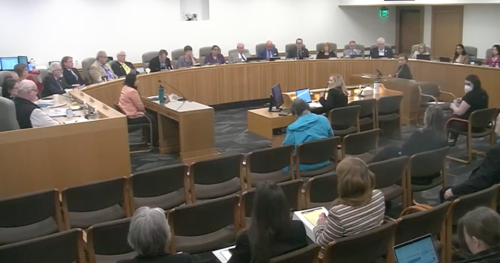Oregon Legislature to vote on expanding access to abortion, gender-affirming care
Published 8:00 am Monday, April 24, 2023

- The Oregon Legislature’s Joint Committee On Ways and Means holds a work session April 13, 2023, at the Capitol in Salem on House Bill 2002, which would bolster state law on abortion and gender-affirming care as well as expand access and establish new protections for providers of these services and patients seeking them. HB 2002 was one of the bills that prompted Senate Republicans walkout for six weeks to prevent a quorum.
SALEM — An Oregon House bill making its way to a vote seeks to clarify and strengthen state law relating to abortion and gender-affirming care as well as expand access and establish new protections for providers of these services and patients seeking them.
House Bill 2002, the Reproductive Health and Access to Care bill was voted out of the joint Ways & Means Committee earlier this month and is on the House Desk for a second reading.
Trending
The Dobbs v. Jackson Women’s Health Organization case decided in 2022 by the Supreme Court led to the reversal of the right to abortion at the federal level.
This has left it up to individual states to decide whether or not to uphold legal access to abortion. Several have opted to ban it and some, like Idaho, are attempting to pass laws that would incriminate residents for crossing state lines to obtain service as well as their care providers.
“The vast majority of people believe that we need to have personal autonomy about our health care and that health care is better decided by doctors and patients than politicians,” said Sen. Elizabeth Steiner, D, northwest Portland, one of the bill’s chief sponsors and a family physician.
Oregon legislators and their constituents alike had concerns about access to abortion following the Dobbs decision. A working group was convened by Speaker of the House Dan Rayfield that discussed that issue as well as gaps in access to gender-affirming care in light of new legislation in other states which block access.
“We really wanted to continue to be a leader here in Oregon on reproductive and gender affirming care,” said co-sponsor Rep. Andrea Velderrama, D, east Portland.
Trending
To learn more about House Bill 2002, visit shorturl.at/lswAN.
To see the HB 2002 work session of April 13, visit shorturl.at/azCR4.
What’s includedHB 2002 will force insurance providers to cover an expanded list of reproductive and gender-affirming health care which includes contraceptives, abortion, domestic violence counseling, sexually transmitted infections screening and breastfeeding support.
It also would expand the definition of medically necessary gender-affirming care to include traditionally cosmetic procedures such as facial affirmation surgery — including electrolysis to remove facial hair—and some implants among others.
The Oregon Health Plan and private insurers have been covering other types of gender-affirming care such as hormone treatment and some surgeries since 2015.
“Transgender people have a higher risk of suicide due to bullying and rejection by society. We are trying to prevent loss of life with these bills. These are life-saving treatments that we think all Oregonians deserve access to,” Steiner said, adding that, likewise, abortions still happen where banned but with increased loss of life amongst patients seeking alternative routes.
Included in HB 2002 is the pilot of a mobile health clinic for underserved regions, especially in rural parts of Oregon where resources can be few and far between and which disproportionately affects low-income communities, people of color, refugees and other marginalized people.
As Steiner pointed out, a right to health care does not necessarily guarantee access.
There also is a reproductive health grant fund for student health centers at public institutions of higher education to fulfill medication access codified in the bill.
“As to who can access what care at what age in this bill already exists in one way or another or did prior to the Dobbs Decision,” Steiner explained.
Community feedbackThe statutes that HB 2002 would double down on compelled many to submit their testimony at a five-hour public hearing held in March.
“Reproductive health care and medically necessary gender-affirming treatments should be fundamental rights in this free country, and we Oregonians should not be subject to the religious beliefs of a minority of the citizens,” said Karen King of Pendleton.
Some other local testimonies raised concerns about situations that might arise or be enabled by HB 2002 and the earlier legislation its backers seek to strengthen. They feel that enhanced access through new programs will put more minors at risk of making life-altering decisions without parental guidance.
Franklin Humber of La Grande voiced, “If people want these procedures then they should pay for them like any other elective surgery.” His statements reflected others which related past experiences of seemingly necessary care not being covered by insurers or protected by law.
Many expressed that more focus should be placed on other solutions for people experiencing gender dysphoria.
Steiner said, “The standard of care almost never includes surgical procedures. Almost everything provided under the age of 18 is reversible. The regret rate for transitioning is 1% and most of the time regret is due to pressure from others.”
In contrast, she cited that the regret rate for knee replacement surgery is 18%. “No one is saying we shouldn’t do knee replacement surgeries.”
Steiner added that, according to the Oregon Health Authority, in 2021, more than 7,100 abortions were performed in Oregon. Only 14 were for patients under the age of 15.
There also was the concern voiced that insurance premiums would go up for all as insurance companies spread out the cost of covering more services, especially as more people flock to Oregon where there are more providers for these types of care. A distrust of providers looking to cash in on new mandatory coverage requirements was a connected topic of concern.
“Legislatively forcing an insurance company to pay for dangerous medical procedures without the payee’s knowledge or consent, which HB 2002 does, absolutely violates a parent’s constitutional right to determine what is best for their children,” said Shannon Garlitz of Union County.
Chuck Gasaway of Klamath Falls seemed to feel similarly. “Providers, with vested interests in the sale of goods and performing services with no concern for the future of the child, would have access to the child without the knowledge of parent or guardian, who may need to deal with the long-term impact of decisions they were excluded from.”
Others were disconcerted by the proposed repeal of a 19th century statute which currently makes it a crime to conceal the birth of a child. Valderrama described it as “draconian” and Steiner said it was codified to “shame people who had babies out of wedlock.”
She pointed out that it is already a crime to harm or kill a baby born alive but explained that the old statute is at times twisted to accuse those who terminate a pregnancy using medication of concealing a birth.
Another major sticking point are provisions that would grant “protections to prevent interference with health care centers from abuse, which would be punishable by a maximum 364 days’ imprisonment or a $6,250 fine.
Valderrama said the work group revealed Oregon care providers and patients have been subjected to harassment on their way to work and even followed home. health care facilities will often experience people repeatedly calling in to keep the lines busy, barring those trying to call with genuine inquiries.
Humber asserted HB 2002 violates free speech rights.
“The components were carefully crafted with the state attorney general and Department of Justice. We are not attempting to infringe on anyone’s right to protest … to exercise their First Amendment rights,” Valderrama affirmed.
Undoubtedly, concerns will persist amongst those who hold them as dialog continues surrounding the bill.
HB 2002 is set to have a date-certain vote in the House on May 1.
“Reproductive health care and medically necessary gender-affirming treatments should be fundamental rights in this free country, and we Oregonians should not be subject to the religious beliefs of a minority of the citizens.”
— Karen King of Pendleton
“Legislatively forcing an insurance company to pay for dangerous medical procedures without the payee’s knowledge or consent, which HB 2002 does, absolutely violates a parent’s constitutional right to determine what is best for their children.”
— Shannon Garlitz of Union County









